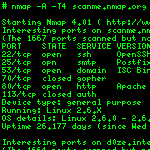Saturday, November 24, 2007
at
8:18 AM
|
 Introduction
IntroductionNmap ("Network Mapper") is a free and open source (license) utility for network exploration or security auditing. Many systems and network administrators also find it useful for tasks such as network inventory, managing service upgrade schedules, and monitoring host or service uptime. Nmap uses raw IP packets in novel ways to determine what hosts are available on the network, what services (application name and version) those hosts are offering, what operating systems (and OS versions) they are running, what type of packet filters/firewalls are in use, and dozens of other characteristics. It was designed to rapidly scan large networks, but works fine against single hosts. Nmap runs on all major computer operating systems, and both console and graphical versions are available.
Nmap is ...
- Flexible: Supports dozens of advanced techniques for mapping out networks filled with IP filters, firewalls, routers, and other obstacles. This includes many port scanning mechanisms (both TCP & UDP), OS detection, version detection, ping sweeps, and more. See the documentation page.
- Powerful: Nmap has been used to scan huge networks of literally hundreds of thousands of machines.
- Portable: Most operating systems are supported, including Linux, Microsoft Windows, FreeBSD, OpenBSD, Solaris, IRIX, Mac OS X, HP-UX, NetBSD, Sun OS, Amiga, and more.
- Easy: While Nmap offers a rich set of advanced features for power users, you can start out as simply as "nmap -v -A targethost". Both traditional command line and graphical (GUI) versions are available to suit your preference. Binaries are available for those who do not wish to compile Nmap from source.
- Free: The primary goals of the Nmap Project is to help make the Internet a little more secure and to provide administrators/auditors/hackers with an advanced tool for exploring their networks. Nmap is available for free download, and also comes with full source code that you may modify and redistribute under the terms of the license.
- Well Documented: Significant effort has been put into comprehensive and up-to-date man pages, whitepapers, and tutorials. Find them in multiple languages here.
- Supported: While Nmap comes with no warranty, it is well supported by the community and we appreciate bug reports and patches. If you encounter a problem, please follow these instructions.
- Acclaimed: Nmap has won numerous awards, including "Information Security Product of the Year" by Linux Journal, Info World and Codetalker Digest. It has been featured in hundreds of magazine articles, several movies, dozens of books, and one comic book series. Visit the press page for further details.
- Popular: Thousands of people download Nmap every day, and it is included with many operating systems (Redhat Linux, Debian Linux, Gentoo, FreeBSD, OpenBSD, etc). It is among the top ten (out of 30,000) programs at the Freshmeat.Net repository. This is important because it lends Nmap its vibrant development and user support communities.
This is the traditional compile-it-yourself format. The Nmap tarball compiles under UNIX (including Linux, Solaris, Free/Net/OpenBSD, and Mac OS X) and Windows. It includes Zenmap, the GUI frontend. Nmap is now offered in bzip2 format as well as traditional gzip.
Detailed compilation instructions and options are provided here, though this usually does the trick for Linux/BSD/Solaris systems:
bzip2 -cd nmap-4.23RC2.tar.bz2 | tar xvf -
cd nmap-4.23RC2
./configure
make
su root
make install
Latest development Nmap release tarball (recommended): nmap-4.23RC2.tar.bz2 (or gzip compressed)
Latest stable Nmap tarball: nmap-4.20.tar.bz2 (or gzip compressed)





0 comments:
Post a Comment